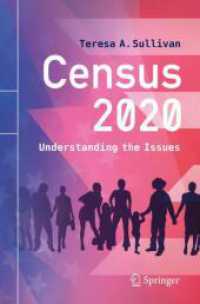基本説明
New in paperback. Hardcover was published in 1998.
Full Description
H. P. Grice virtually discovered the phenomenon of implicature (to denote the implications of an utterance that are not strictly implied by its content). Gricean theory claims that conversational implicatures can be explained and predicted using general psycho-social principles. This theory has established itself as one of the orthodoxes in the philosophy of language. Wayne Davis argues controversially that Gricean theory does not work. He shows that any principle-based theory understates both the intentionality of what a speaker implicates and the conventionality of what a sentence implicates. In developing his argument the author explains that the psycho-social principles actually define the social function of implicature conventions, which contribute to the satisfaction of those principles. This challenging book will be of importance to philosophers of language and linguists, especially those working in pragmatics and sociolinguistics.
Contents
Introduction; Part I. Concept and Theory: 1. The concept of implicature; 2. Theoretical importance; 3. Gricean theory; 4. Grice's razor; 5. Sufficiency; Part II. Differentiation: 6. Quantity implicatures; 7. Tautology implicatures; 8. Conjunction implicatures; 9. Idioms; 10. Non-Gricean speech; Part III. Determinacy and Calculability: 11. Background constraints; 12. The meaning constraint problem; 13. The rhetorical figure problem; 14. 'Indeterminate' implicatures; 15. Relevance implicatures; 16. Close-but implicatures; 17. Quantity implicatures: the possibility of ignorance; 18. Quantity implicatures: other possibilities; 19. Tautology implicatures; 20. Conjunction implicatures; 21. Conflicting principles; 22. 'Relevance' theory; 23. Modal implicatures; Part IV. Presumption and Mutual Knowledge: 24. The cooperative presumption condition; 25. The presumption of relevance; 26. Mutual knowledge; 27. Meaning versus communication; 28. Implicature and inference; 29. The recognition of implicature; Part V. The Existence of Implicature Conventions: 30. Conventions; 31. Quantity implicatures; 32. Tautology implicatures; 33. Conjunction implicatures; 34. Disjunction implicatures; 35. Modal implicatures; 36. Figures of speech; 37. Relevance implicatures; 38. Close-but implicatures; 39. Manner implicatures; 40. Interrogative and imperative implicatures; Part VI. The Nature of Implicature Conventions: 41. First-order versus second-order semantic conventions; 42. Idioms; 43. Indirect speech-act conventions; 44. The role of conversational principles; 45. The principle of antecedent relation; 46. The universality of implicature conventions; 47. Conclusion; References; Index.








